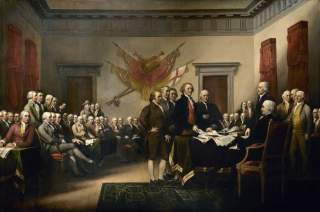Declaration of Independence: Shocking Sacrifices Were Made by the Men Who Signed It
Those who signed paid a big price for freedom.
William Whipple:
William Whipple of New Hampshire served as brigadier general in the state militia. He fought against Gen. Burgoyne at the battles of Stillwater and Saratoga (commonly pointed to as the turning point for Americans in the war) in 1777. The following year, Whipple participated in the retaking of Rhode Island.
Thomas McKean:
Thomas McKean of Delaware served as colonel in the Delaware state militia. Once McKean was appointed to the office of President of Delaware in 1777, he was targeted by the British (the British captured John McKinley, the previous president). He had to move his family on five occasions because of raids by both the British and local Indian tribes.
Francis Lewis:
Francis Lewis of New York signed the declaration on August 2, 1776. Although he was present when independence was declared a month earlier, the New York delegation did not get permission from the state’s legislature to sign the document. A few months after affixing his signature on the declaration, British troops destroyed the Long Island estate of Lewis. They took Lewis’ wife and put her in prison where she was tortured on a regular basis. Under the direction of George Washington, she was finally returned in a prisoner exchange two years later.
Benjamin Franklin:
Known as the sage of Philadelphia, Benjamin Franklin of Pennsylvania was the oldest of the signers of the declaration. Prior to setting sail for France in late 1776 to ask the French for assistance in the war, Franklin gave his entire fortune to Congress to help fund the war.
John Hart:
Hessian mercenaries plundered signer John Hart’s 400-acre farm outside of Hopewell, New Jersey. Prior to his farm being captured, Hart was forced to leave his family because of advancing British troops. During his absence, his wife died, and his children were sent to live with neighbors.
William Ellery:
The estate of William Ellery of Delaware was burned down during the British occupation of Newport, Rhode Island. Ellery served in the Second Continental Congress until the British left Newport, which they held for three years. He returned home in order to salvage what was left of his property.
Joseph Hewes:
With his fortunes built on trade, Joseph Hewes of North Carolina was a vigorous proponent of the decision of the First Continental Congress to cut off all imports and exports with the British. This of course had the effect of drying up his wealth. Interestingly, Hewes also renounced his Quaker religion in order to support the war.
James Smith:
A delegate from Pennsylvania, James Smith served in the Pennsylvania militia as captain, colonel, and then as brigadier general. He was one of the first to raise men for the possibility of defending his home state, a duty he took up beginning as early as 1774.
Benjamin Harrison:
Benjamin Harrison of Virginia, whose son and grandson both served as U.S. presidents, complained in a letter to Gov. William Livingston of New Jersey that his debts had accumulated substantially because of the “ravages” and “plunderings” of the British.
William Floyd:
While William Floyd of New York served as a delegate in the Second Continental Congress, the British sacked his estate, forcing his family to flee. Though they made it safely to Connecticut, his family was left without a home for the duration of the war.
William Hooper:
William Hooper of North Carolina outlasted British raiders who were looking to capture him and his family. In 1782, he and his family fled Wilmington after it fell to the British. Though much of his property was destroyed, he and his family were reunited at the conclusion of the war.
Lyman Hall:
The British destroyed the home and plantation of Lyman Hall of Georgia. Luckily, his family escaped before the British arrived and moved up North to be with him.
This first appeared in The Daily Signal here.

